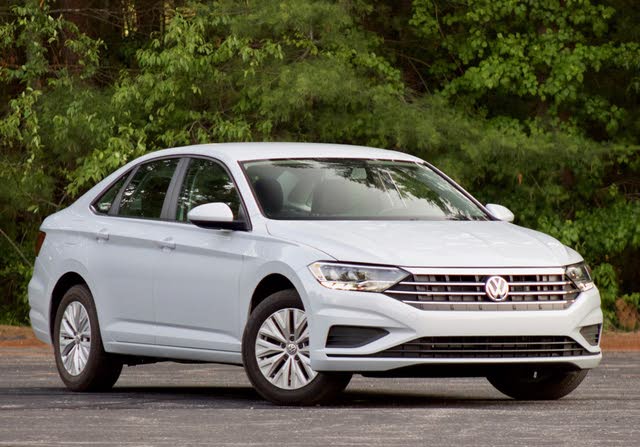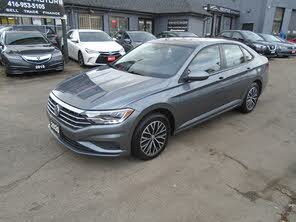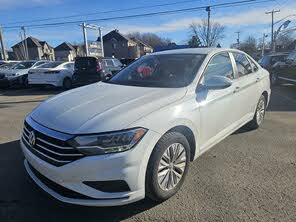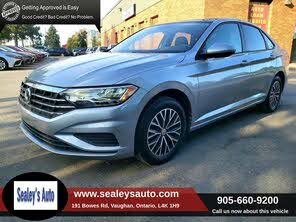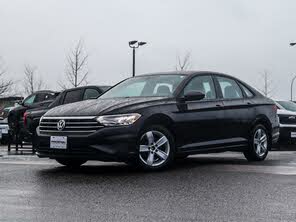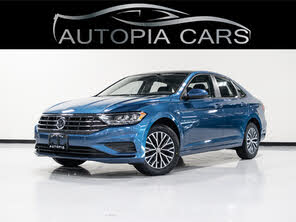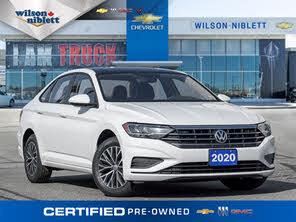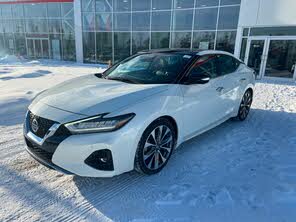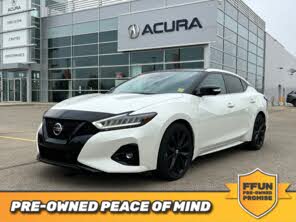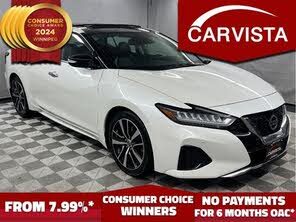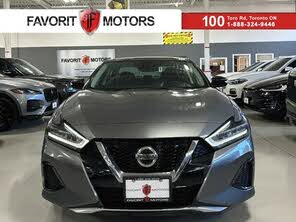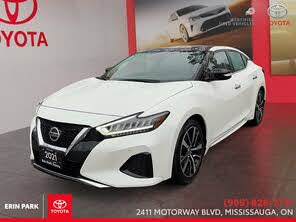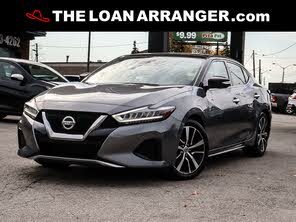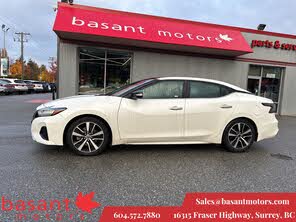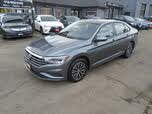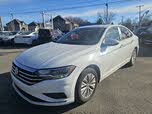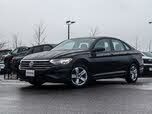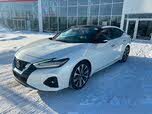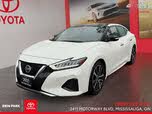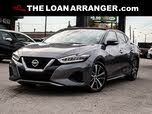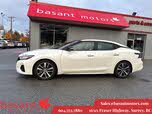2020 Volkswagen Jetta vs 2021 Nissan Maxima
Overview | |
MSRP$18,895 | MSRP$37,090 |
Average price$21,425 | Average price$28,316 |
Listings105 | Listings9 |
Ratings & Reviews | |
User Reviews | User Reviews |
Expert reviews | Expert reviews7.3 out of 10 |
2020 Volkswagen Jetta Reviews Summary | |
2021 Nissan Maxima Reviews SummaryThe 2021 Nissan Maxima celebrates 40 years on sale, making it one of the oldest Japanese automotive nameplates in continuous use. While it’s impressive for any model to survive four decades, the Maxima has spent most of its history mired in mediocrity. The Nissan Maxima name first appeared in 1981 as a rebranding of the Datsun 810 sedan. The original Maxima/810 was a true enthusiast’s car, boasting rear-wheel drive (RWD) and a sporty character that led Nissan to declare it a “four-door sports car.” However, that only lasted for a few years. With its first redesign for the 1985 model year, the Maxima switched to front-wheel drive (FWD) and was positioned as Nissan’s flagship sedan. It’s been that way ever since. Nissan has continued to gesture in the direction of that original RWD model, but for most of its 40 years, the Maxima has been a slightly sportier alternative to full-size sedans like the Toyota Avalon, rather than a BMW beater. So it is with the current, eighth-generation, Maxima, which debuted for the 2016 model year. It enters the 2021 model year with few changes. We drove the Nissan Maxima Platinum trim level for this review. | |
No video found | No video found |
Popular Features & Specs | |
Engine1.4L 147 hp I4 | Engine3.5L 300 hp V6 |
Drive TrainFWD | Drive TrainFWD |
Seating Capacity5 | Seating Capacity5 |
Horsepower147 hp @ 5000 rpm | Horsepower300 hp @ 6400 rpm |
MPG City30 | MPG City20 |
MPG Highway40 | MPG Highway30 |
Engine | |
Engine Name1.4L 147 hp I4 | Engine Name3.5L 300 hp V6 |
Torque184 lb-ft @ 1400 rpm | Torque261 lb-ft @ 4400 rpm |
Horsepower147 hp @ 5000 rpm | Horsepower300 hp @ 6400 rpm |
DrivetrainFWD | DrivetrainFWD |
Fuel Economy | |
MPG City30 | MPG City20 |
MPG Highway40 | MPG Highway30 |
Interior | |
Seating Capacity5 | Seating Capacity5 |
Key Features | |
Navigation System | Navigation SystemStandard |
Safety | |
Front Crash Overall4 | Front Crash Overall5 |
Side Crash Overall5 | Side Crash Overall5 |
Dimensions & Capacity | |
Cargo Space14.1 cu ft | Cargo Space14.3 cu ft |
Curb Weight2888 lbs | Curb Weight3612 lbs |
Height57.4 in | Height56.5 in |
Length185.1 in | Length192.8 in |
Width70.8 in | Width73.2 in |
Wheelbase105.7 in | Wheelbase109.3 in |
Maximum Payload970 lbs | Maximum Payload1073 lbs |
Number of doors4 | Number of doors4 |
Overview | ||
MSRP | $18,895 | $37,090 |
Average price | $21,425 | $28,316 |
Listings | ||
Ratings & Reviews | ||
User reviews | ||
Expert reviews | 7.3 out of 10Read full review | |
Pros & cons | ||
Summary | The 2021 Nissan Maxima celebrates 40 years on sale, making it one of the oldest Japanese automotive nameplates in continuous use. While it’s impressive for any model to survive four decades, the Maxima has spent most of its history mired in mediocrity. The Nissan Maxima name first appeared in 1981 as a rebranding of the Datsun 810 sedan. The original Maxima/810 was a true enthusiast’s car, boasting rear-wheel drive (RWD) and a sporty character that led Nissan to declare it a “four-door sports car.” However, that only lasted for a few years. With its first redesign for the 1985 model year, the Maxima switched to front-wheel drive (FWD) and was positioned as Nissan’s flagship sedan. It’s been that way ever since. Nissan has continued to gesture in the direction of that original RWD model, but for most of its 40 years, the Maxima has been a slightly sportier alternative to full-size sedans like the Toyota Avalon, rather than a BMW beater. So it is with the current, eighth-generation, Maxima, which debuted for the 2016 model year. It enters the 2021 model year with few changes. We drove the Nissan Maxima Platinum trim level for this review. | |
Video | No video found | No video found |
Popular Features & Specs | ||
Engine | 1.4L 147 hp I4 | 3.5L 300 hp V6 |
Drive Train | FWD | FWD |
Seating Capacity | 5 | 5 |
Horsepower | 147 hp @ 5000 rpm | 300 hp @ 6400 rpm |
MPG City | 30 | 20 |
MPG Highway | 40 | 30 |
Engine | ||
Engine Name | 1.4L 147 hp I4 | 3.5L 300 hp V6 |
Torque | 184 lb-ft @ 1400 rpm | 261 lb-ft @ 4400 rpm |
Horsepower | 147 hp @ 5000 rpm | 300 hp @ 6400 rpm |
Drivetrain | FWD | FWD |
Fuel Economy | ||
MPG City | 30 | 20 |
MPG Highway | 40 | 30 |
Interior | ||
Seating Capacity | 5 | 5 |
Key Features | ||
Navigation System | Standard | |
Safety | ||
Front Crash Overall | 4 | 5 |
Side Crash Overall | 5 | 5 |
Dimensions & Capacity | ||
Cargo Space | 14.1 cu ft | 14.3 cu ft |
Curb Weight | 2888 lbs | 3612 lbs |
Height | 57.4 in | 56.5 in |
Length | 185.1 in | 192.8 in |
Width | 70.8 in | 73.2 in |
Wheelbase | 105.7 in | 109.3 in |
Maximum Payload | 970 lbs | 1073 lbs |
Number of doors | 4 | 4 |

By: CarGurus + AI
At CarGurus, our team of experienced automotive writers remain at the heart of our content operation, conducting hands-on car tests and writing insightful guides that are backed by years of industry experience. To complement this, we are harnessing AI to make our content offering more diverse and more helpful to shoppers than ever. To achieve this, our AI systems are based exclusively on CarGurus content, ratings and data, so that what we produce is both unique to CarGurus, and uniquely helpful to car shoppers.
